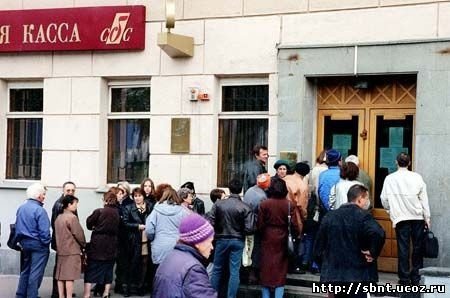
The English word “default” means “failure to fulfill pecuniary obligations, especially to repay a loan.” On this day, the country woke up back at the bottom of the ladder. The Government and the Bank of Russia announced “a set of measures to normalize the financial and budgetary policy.” In plain Russian, it meant that the country’s economy faced a severe crisis. Prime Minister Sergey Kirienko said as follows: “With a foreign debt of more than a hundred billion dollars and an internal debt of four hundred billion rubles, Russia can no longer live without borrowing any money to repay the old debt.”
In an attempt to normalize the financial policy, all payments on the government short-term bonds were suspended and the trading band was expanded to 9,50 rubles per U.S. dollar. In the West, this band has an incredible figurative name — “snake in the tunnel.” The snake, however, smashed the tunnel to pieces, as the U.S. dollar was sold for 15 rubles in a matter of days. Eventually, the U.S. dollar doubled its value and commercial banks, on the contrary, departed this life with savings of their depositors who were then branded “defrauded depositors.”
Most of them had a tough time – money and jobs were lost. But the folklore became richer: “until 17 August, it was prestigious to have a mobile phone. It was desirable to have a business phone ever since,” “yesterday, a wife defaulted matrimonial duties,” “when everyone is crying, someone is making money by selling handkerchiefs.” The latter was very true, as the Russian industry shook off the yoke of the expensive ruble and after a brush-down started making handkerchiefs and something else. The shock caused by the default made Russian companies lose their taste for refusing to pay taxes and holding back wages. In six months, the U.S. dollar offered for 30 rubles would no longer scare people and diapers were still on the shelves despite the threats.

























